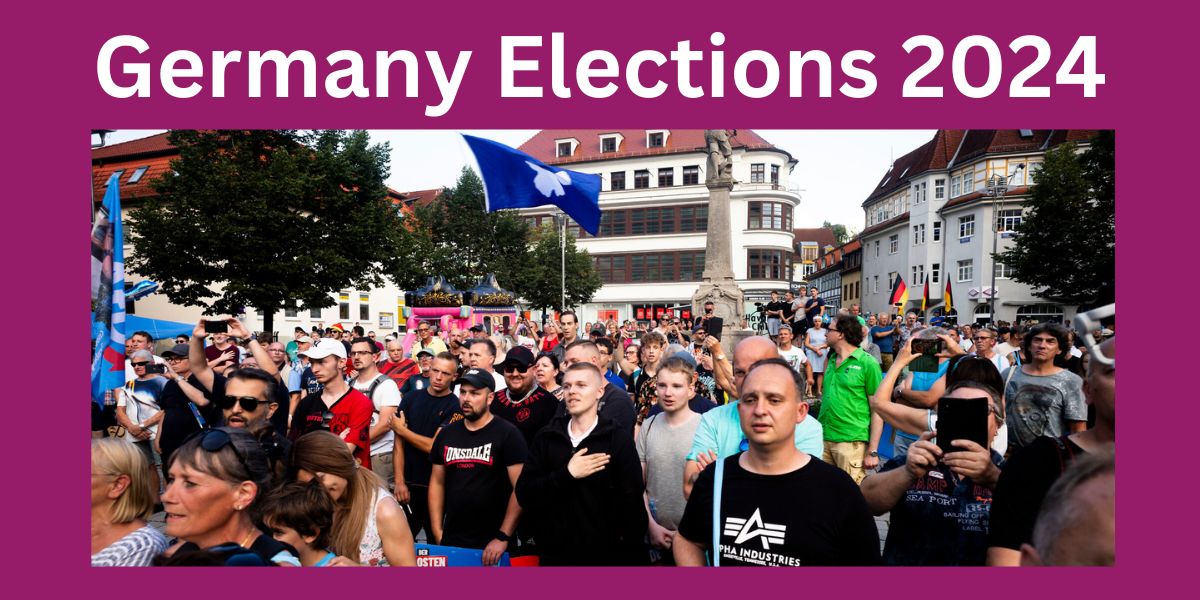The 2024 elections in Germany have proven to be a game-changer in the country’s political landscape. For the first time, the far-right Alternative for Germany (AfD) has won a regional election, sending shockwaves across the nation. But what does this victory mean for Germany’s future? How did a party often labeled as controversial manage to secure this win? In this article, we will explore the details of the recent elections, the rise of AfD, and what it could mean for Germany moving forward.
The Shocking Victory: A Turning Point in German Politics
The recent regional election victory for the Alternative for Germany (AfD) marks a significant turning point in German politics. The party, often criticized for its nationalist and anti-immigration stances, secured a majority vote in one of Germany’s states. This unprecedented win has left many political analysts and citizens wondering about the future of German democracy and its political landscape.
What is Alternative for Germany (AfD)?
A Brief History of the AfD
The AfD was founded in 2013, initially as a response to the Eurozone crisis. Its primary focus at the time was on opposing the European Union’s financial policies. However, the party quickly shifted its focus to more controversial issues, such as immigration and Islam. Over the years, AfD has gained popularity, particularly in Eastern Germany, by capitalizing on economic discontent and fears about cultural change.
AfD’s Ideology
AfD is often described as a far-right party with strong nationalist sentiments. Its policies include a tough stance on immigration, skepticism towards the European Union, and a focus on German identity. Critics argue that AfD’s rhetoric borders on xenophobia and racism, while supporters believe the party is simply protecting German culture and values.
The Election: How Did AfD Win?
Economic Concerns
One of the key factors contributing to AfD’s success is the economic anxiety among voters. In some regions, particularly in Eastern Germany, unemployment rates are higher, and there is a sense of being left behind compared to the more prosperous Western regions. AfD has tapped into these concerns, promising economic rejuvenation and protection of German jobs.
Immigration and Security
AfD’s strong stance against immigration has resonated with a significant portion of the population. The party has consistently argued that uncontrolled immigration poses a threat to national security and social cohesion. By emphasizing these issues, AfD has managed to attract voters who feel that traditional parties have not addressed their concerns adequately.
A Crisis of Confidence in Traditional Parties
The success of AfD also reflects a broader crisis of confidence in traditional political parties. Many voters feel that the established parties, such as the Christian Democratic Union (CDU) and the Social Democratic Party (SPD), have become out of touch with the everyday concerns of ordinary Germans. AfD’s outsider status and anti-establishment rhetoric have attracted those disillusioned with the political status quo.
What This Victory Means for Germany
A Shift in Political Landscape
AfD’s victory signals a significant shift in Germany’s political landscape. For decades, Germany has been known for its stable and moderate political environment. However, the rise of AfD indicates a growing polarization in the country. This could lead to a more fragmented political system, making it difficult to form stable coalitions.
Impact on National Politics
While AfD’s victory is currently limited to a regional level, it could have broader implications for national politics. If the party continues to gain support, it could become a significant force in the Bundestag, Germany’s federal parliament. This could challenge the traditional dominance of the CDU and SPD, potentially leading to shifts in national policy, especially concerning immigration and EU relations.
European Implications
Germany is a key player in the European Union, and any significant political shift within the country has the potential to impact the entire continent. AfD’s skepticism towards the EU and its policies could strain Germany’s relationships with other EU member states. This could lead to a more fragmented and less unified European Union.
Public Reaction to AfD’s Victory
Supporters Rejoice
For AfD supporters, this victory is a cause for celebration. Many feel that their concerns are finally being addressed, and they see the win as a validation of their beliefs. AfD’s success has energized its base, and there is a sense of optimism about the future.
Opposition Voices Concern
On the other hand, many Germans are deeply concerned about AfD’s rise to power. Human rights organizations, political commentators, and members of other parties have expressed alarm, fearing that the party’s far-right ideology could lead to increased division and intolerance. Protests have erupted in some cities, with citizens voicing their opposition to AfD’s policies.
The Road Ahead: What to Expect
Potential Challenges for AfD
Despite its recent success, AfD faces several challenges moving forward. Governing is different from campaigning, and the party will need to demonstrate its ability to address the issues it has highlighted effectively. Additionally, AfD’s controversial views may lead to difficulties in forming alliances with other parties, which is often necessary in Germany’s coalition-based political system.
The Role of Traditional Parties
Traditional parties like the CDU and SPD will need to reassess their strategies in light of AfD’s success. They may need to address the concerns of voters who have shifted their support to AfD, particularly around issues of immigration, security, and economic inequality. The traditional parties’ response will be crucial in shaping the future political landscape.
Conclusion
The victory of the Alternative for Germany (AfD) in a regional election marks a new chapter in German politics. It reflects deep-seated concerns among a significant portion of the population, including economic anxiety, fears about immigration, and dissatisfaction with traditional parties. While AfD’s success is currently limited to a regional level, it has the potential to reshape national and even European politics. As Germany moves forward, the actions of both AfD and the traditional parties will play a critical role in determining the country’s future direction.
FAQs
1. What is the Alternative for Germany (AfD)?
AfD is a far-right political party in Germany, founded in 2013. It initially focused on opposing the European Union’s financial policies but has since shifted its stance to include anti-immigration, nationalism, and skepticism towards the EU.
2. Why did AfD win the regional election?
AfD’s victory can be attributed to several factors, including economic concerns, strong anti-immigration sentiments, and a loss of confidence in traditional political parties. The party has managed to tap into voter dissatisfaction and present itself as an alternative to the status quo.
3. What are the implications of AfD’s victory?
AfD’s win could lead to a shift in Germany’s political landscape, with potential impacts on national policy, coalition formations, and even Germany’s role in the European Union. The victory also reflects a growing polarization in German society.
4. How have Germans reacted to AfD’s win?
Reactions have been mixed. AfD supporters are celebrating the victory as a step towards addressing their concerns, while many others, including political opponents and human rights organizations, have expressed alarm about the party’s far-right ideology.
5. What challenges does AfD face moving forward?
AfD faces challenges in transitioning from campaigning to governing. The party will need to demonstrate its ability to address the issues it has highlighted effectively. Additionally, its controversial views may make it difficult to form alliances with other parties, which are often necessary in Germany’s coalition-based political system.










